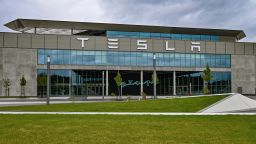Tesla's German Gigafactory: Balancing Economic Growth and Environmental Concerns in Pursuit of Sustainable Development Goals
The recent events surrounding Tesla's Gigafactory in Germany have highlighted tensions between economic development and environmental concerns, underscoring the complexity of sustainable development. Climate protesters, expressing their discontent over Tesla's expansion plans, attempted to break into the plant in Brandenburg, Germany, prompting police intervention and resulting in multiple arrests.

This incident resonates particularly with several UN Sustainable Development Goals (SDGs), notably Goal 7: Affordable and Clean Energy, and Goal 13: Climate Action. Tesla's Gigafactory represents a significant investment in clean energy technology, aligning with the aim of Goal 7 to ensure access to affordable, reliable, sustainable, and modern energy for all. However, the expansion plans have faced opposition from environmental activists who argue that the factory's construction involves clearing acres of forest, raising concerns about its impact on biodiversity and local ecosystems.
Moreover, the protests raise questions about Goal 11: Sustainable Cities and Communities. While economic development projects like Tesla's Gigafactory can bring opportunities for job creation and infrastructure development, they must also ensure that communities have a say in decision-making processes and that development is carried out in a sustainable manner, balancing economic growth with environmental and social considerations.
Additionally, the clashes between protesters and authorities highlight the importance of Goal 16: Peace, Justice, and Strong Institutions. Effective governance and access to justice for all are essential for resolving conflicts and addressing grievances in a fair and transparent manner. The involvement of police forces from neighboring states and national levels underscores the need for coordinated responses to maintain public order while upholding fundamental rights.
In summary, the events at Tesla's Gigafactory in Germany illustrate the intricate interplay between economic development, environmental conservation, social equity, and governance, highlighting the challenges and opportunities inherent in pursuing sustainable development goals.
Protesters attempt to storm Tesla’s factory in Germany
As many as 800 activists gathered outside Tesla’s factory near Berlin Friday to protest its expansion plans, and some of them clashed with police as they attempted to break into the plant.
“There are currently 800 activists on the Tesla Gigafactory site as part of the Disrupt Tesla Action Days,” Disrupt, a coalition of self-declared anti-capitalist groups that organized the protest, said in a statement on its website.
Police officials said in a press release Friday that, “people from the previous protest march ran through the forest towards the Tesla company premises. As they were in the immediate vicinity of the Deutsche Bahn railroad tracks at the time and partially entered them, rail traffic between Erkner and Fürstenwalde had to be temporarily stopped.”
Police also said they had prevented the group from entering the Tesla premises.
Ole Becker, a Disrupt spokesperson, told CNN: “It was a good day for activists. We saw a lot of police violence unfortunately,” he added. “I saw a lot of injured people… I have seen things today which I haven’t seen for many years.”
Neither Tesla (TSLA) nor police in the German state of Brandenburg, where the plant is located, have responded to a CNN request for comment.
But Tesla CEO Elon Musk wrote in a post on X Friday: “Protesters did not manage to break through the fence line. There are still two intact fence lines all around (the factory).”
Disrupt argues that Musk’s plans to more than double the production capacity of Tesla’s only factory in Europe would damage the local environment.
The group says the expansion would require clearing swathes of the surrounding forest and would further strain local water supply. It has planned four days of protests, which started Wednesday.
Tesla shut the factory Friday to all employees in anticipation of crowds gathering outside in protest against the planned expansion.
A stoppage of the plant’s production lines this Friday was announced back in January, CNN affiliate RTL reported earlier this week, quoting a Tesla spokesperson. But with the protests “in mind,” the electric vehicle maker has decided that all other workers at the factory should also stay at home, RTL said.
In early March, Tesla was also forced to close the plant, that time for a week, after a high-voltage electricity pylon delivering power to the factory was set on fire. A group of far-left activists claimed responsibility for the arson attack.
Police in Brandenburg said Wednesday that they had prepared for “extensive” operations, noting that they would be supported by federal police and several other state police forces.
“Disruptive protests as well as criminal acts typical of this kind of gathering cannot be ruled out,” they said in a statement. “Consequently, the police are prepared for both a peaceful and non-peaceful outcome. If crimes are committed, the police will intervene resolutely.”
- CNN’s Chris Stern contributed to this report
What is Your Reaction?
 Like
0
Like
0
 Dislike
0
Dislike
0
 Love
0
Love
0
 Funny
0
Funny
0
 Angry
0
Angry
0
 Sad
0
Sad
0
 Wow
0
Wow
0













































































